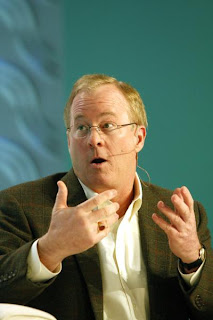California energy regulators delivered a rare rebuke to Pacific Gas and Electric Co. on Thursday, banning some of the hardball tactics the utility has used in its efforts to derail Marin County's new public power agency.Darbee's brazen political overreach in launching Proposition 16, his sole-sponsored assault on the California Constitution and the historical prerogatives of the CPUC, may be slowly awakening Commissioners long criticized for carrying styrofoam police batons engraved with the mantra "can't we just get along?"
Take, for example, the last compensation scandal to hit PG&E, the notorious $84.5 million "retention bonuses" paid to 17 executive worthies as PG&E emerged from bankruptcy in 2004. In extraordinary wording that still reads like comic opera Pontius Pilate, the CPUC observed:
These bonuses vested only days after PG&E Corporation (the holding company), PG&E (the utility), and the Commission entered into a Modified Settlement Agreement regarding PG&E's emergence from bankruptcy. The size and timing of these bonuses raised concerns regarding ratepayer impact and public policy.
We have given the issue special attention. We find that none of the $84.5 million has been, or will be, charged to ratepayers. We adopt additional accounting and reporting measures to further ensure that the $84.5 million is charged to shareholders, not ratepayers. We are appalled at the size of the award, and encourage the senior executives to voluntarily return any amounts not needed to meet the program's purpose or that are unreasonable or inequitable. The matter is now in the hands of the 17 senior executives, PG&E's shareholders and the California Legislature.Historical note: Darbee was PG&E Corporation's Chief Financial Officer before, during, and after the bankruptcy fiasco; his predecessor as CEO of the holding company (who grabbed a bonus of more than $17 million for himself) was named by BusinessWeek as one of the worst CEOs of 2003; the bankruptcy deprived shareholders of their dividends for some 4.5 years and sentenced ratepayers to a decade-long special bailout surcharge; and ... drum roll ... none of the $84.5 million was ever returned.
Darbee's obtuseness may blind him to the box into which his Proposition 16 gambit has placed his CPUC overseers. Exactly where did he get his $35 million campaign war chest? Accept the common view and he's misappropriated ratepayer funds, meaning that the CPUC has a major infraction on its hands. Accept Darbee's rationale that he's using shareholder funds, and the CPUC rate-setting generosity looks grossly negligent.
Darbee's blunderbuss approach in Marin has now triggered a CPUC resolution that can easily be dismissed as just another regulatory tsk tsk, but which crosses an unmistakable Rubicon if anyone at PG&E is paying attention. Buried within the gentle bureaucratese admonishing PG&E for what are effectively acts of bribery (to induce the City of Novato not to join the Marin Energy Authority) and extortion (threatening not to supply electricity to the Marin Energy Authority), the CPUC resolution lays down a marker:
... PG&E contends that the Commission lacks the authority to oversee the utility's use of shareholder funds for competitive activities ... We are not persuaded ... The Commission does not lose its authority to regulate a public utility's activities, merely because the utility accounts for the expense of conducting those activities "below the line", i.e., as a shareholder expense.So facing his own compensation firestorm for the ill-timed decision to pay himself 8% more than Goldman Sachs paid its CEO (and 74% above the median for large utility CEOs) in 2009, Darbee now finds that his lack of political acumen may have finally aroused the attention of creatures he should have left asleep.
Were he more a student of California history, he would realize that the regulatory agency he has long attempted to flout and the initiative process he is currently choosing to debase share a certain common origin.
(Photo credit: Darbee, Genesis Photo Agency)



